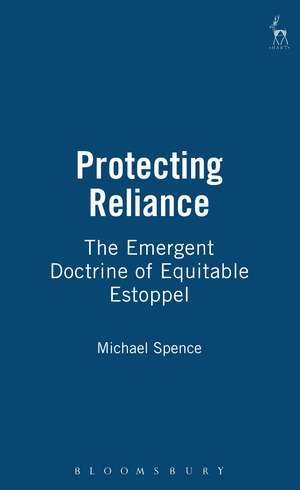Protecting Reliance: The Emergent Doctrine of Equitable Estoppel
Autor Michael Spenceen Limba Engleză Hardback – 31 mar 1999
Preț: 507.48 lei
Preț vechi: 729.49 lei
-30% Nou
Puncte Express: 761
Preț estimativ în valută:
97.14€ • 105.55$ • 81.65£
97.14€ • 105.55$ • 81.65£
Carte tipărită la comandă
Livrare economică 21 aprilie-05 mai
Preluare comenzi: 021 569.72.76
Specificații
ISBN-13: 9781901362626
ISBN-10: 1901362620
Pagini: 212
Dimensiuni: 194 x 129 x 16 mm
Greutate: 0.34 kg
Editura: Bloomsbury Publishing
Colecția Hart Publishing
Locul publicării:London, United Kingdom
ISBN-10: 1901362620
Pagini: 212
Dimensiuni: 194 x 129 x 16 mm
Greutate: 0.34 kg
Editura: Bloomsbury Publishing
Colecția Hart Publishing
Locul publicării:London, United Kingdom
Caracteristici
This book expounds the doctrine emerging from the decisions of the High Court of Australia in Waltons Stores and Verwayen. It examines how the doctrine might operate in a series of problematic cases at the edge of contract law.
Notă biografică
Michael Spence is a Fellow and Tutor in Law of St Catherine's College, Oxford.
Cuprins
CHAPTER I - THE DUTY TO ENSURE THE RELIABILITY OF INDUCED ASSUMPTIONSCHAPTER II - THE EMERGENT DOCTRINE OF EQUITABLE ESTOPPELCHAPTER III - THE UTILITY OF EQUITABLE ESTOPPELCHAPTER IV - EPILOGUE
Recenzii
This well-written book deserves a wide readership. I would recommend it to all those involved in the practice or teaching of the law of obligations and also to legal taxonomists. To the legal practicioner in search of the most appropriate authority to support a particular aspect of equitable estoppel, the rich source of cases in the footnotes (including unreported Australian decisions) is a bonus.
One can only admire this book's brevity, clarity, and purpose... This provocative book will no doubt be the subject of much discussion.
One can only admire this book's brevity, clarity, and purpose... This provocative book will no doubt be the subject of much discussion.
Descriere
This book expounds the duty to ensure the reliability of induced assumptions and shows how it can be used to shape 'equitable' estoppels.
